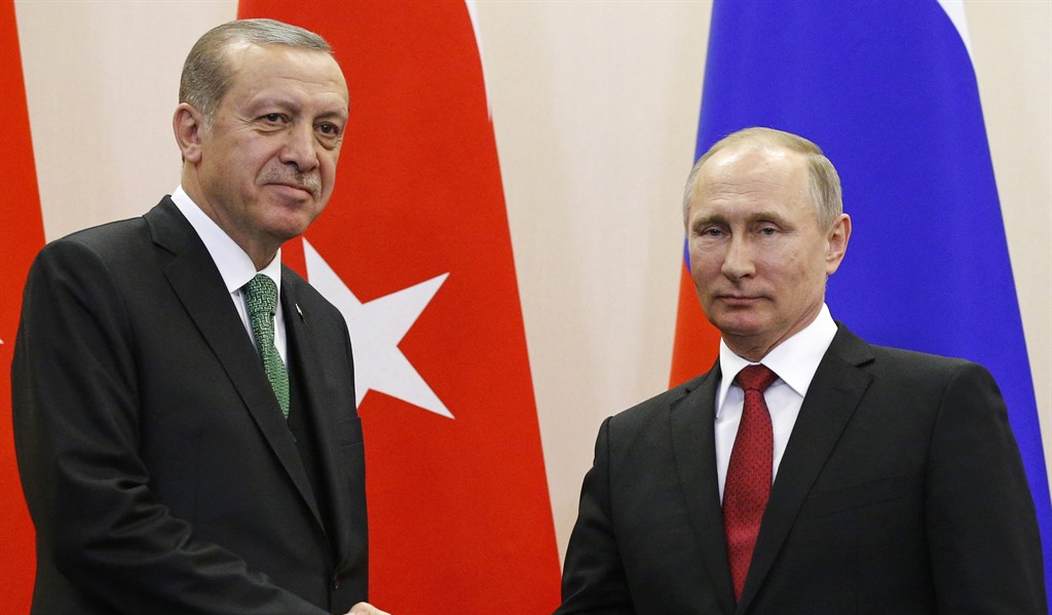Looks like the US response to Bashar al-Assad’s chemical weapons attack got everyone’s attention. Russia, Turkey, and Iran agreed to establish five “de-escalation zones” that will bar any military flights over parts of western Syria, including those of Assad’s forces. The no-fly zone arrangement goes into effect at midnight, and includes Idlib, where the chemical weapons attack took place:
Under the Russian plan, President Bashar Assad’s air force would halt flights over the designated areas across the war-torn country.
Lavrentyev suggested that all military aircraft, including Russian and Turkish, also were prohibited. The same was suggested in a U.N. statement, which said Secretary-General Antonio Guterres “welcomes the commitments to ceasing the use of all weapons, particularly aerial assets.” …
Lavrentyev, whose remarks were carried by Russian news agencies, said “the operation of aviation in the de-escalation zones, especially of the forces of the international coalition, is absolutely not envisaged, either with notification or without. This question is closed.”
That was taken as a shot at the US and a sign that the “deconfliction” communications channel will not be operating when it comes to these areas. The headline on the AP story reads, “Russia: Syria deal bans US-led coalition aircraft,” which is true … but it also bans all other aircraft as well. In fact, the US and Saudi Arabia have come out in support of the agreement, Reuters reports, as it doesn’t interfere with the anti-ISIS efforts in the east for either Russia or the US. UN Secretary-General Antonio Guterres strongly implied that these would be general no-fly zones, not just for certain nations.
Syria took part in the conference where the agreement was reached, but none of the news reports list them as a party to the agreement. Russia and Iran appear to be the guarantors of the de-escalation zone agreement. Those talks did not go smoothly, ABC News notes, as Iran’s participation precipitated a walkout by rebel groups, which accused Iran of being the instigator of the sectarian nature of the fight:
As officials from the three countries — Russia, Iran and Turkey — that back rival sides in the conflict signed the agreement at Syria talks in Kazakhstan on Thursday, some members of the Syrian opposition delegation shouted in protest and walked out of the conference room in Astana, the Kazakh capital.
The opposition is protesting Iran’s participation at the conference and role as a guarantor of the agreement, accusing it of fueling the sectarian nature of the conflict that has killed some 400,000 people and displaced half the country’s population.
“Iran is a country that is killing the Syrian people and the killer cannot be the rescuer,” said Abu Osama Golani, a rebel commander who attended the gathering in Astana.
And Assad’s government didn’t give them much cause for confidence, either:
The walkout and the comments underline the huge difficulties of implementing such a deal. The Syrian government has said that although it will abide by the agreement, it would continue fighting “terrorism” wherever it exists, parlance for most armed rebel groups fighting government troops.
Syrian Kurds have already rejected the agreement, calling it a plan to divide Syria along sectarian lines:
The Syrian Kurdish PYD party rejects a Russian proposal to create de-escalation zones in Syria and views it as “sectarian partition” of the country, a spokesman said on Friday. …
The plan amounts to “dividing Syria up on a sectarian basis,” said Ibrahim Ibrahim, a PYD spokesman, who described it as a “crime”.
Perhaps Ibrahim is correct, especially since all of the powers involved have reason to keep the Kurds oppressed. However, the agreement appears to be more of a response to the chemical weapons attack in Idlib and the US military response to it. The Russians in particular appeared to be surprised by both, and they’d prefer not to get another unpleasant shock from their ally in Damascus. Turkey doesn’t want Assad to remain in power in any case, and would loooooove to see his air force grounded, while Iran wants to keep propping up Assad — and may worry that the next Tomahawks will make that proposition moot. Those are the only real reasons to force Assad’s air force to stay out of those areas.








Join the conversation as a VIP Member